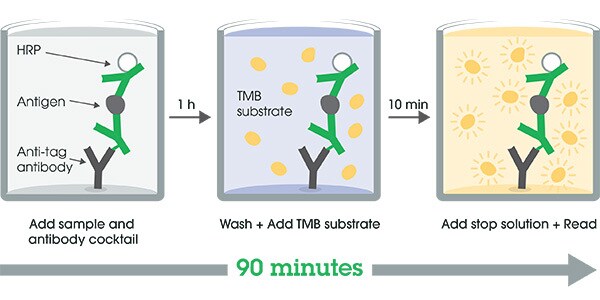Mouse MCP3 ELISA Kit (CCL7) (ab205571)
Key features and details
- One-wash 90 minute protocol
- Sensitivity: 1.53 pg/ml
- Range: 6.25 pg/ml - 400 pg/ml
- Sample type: Cell culture supernatant, Plasma, Serum
- Detection method: Colorimetric
- Assay type: Sandwich (quantitative)
- Reacts with: Mouse
Overview
-
Product name
Mouse MCP3 ELISA Kit (CCL7)
See all MCP3 kits -
Detection method
Colorimetric -
Precision
Intra-assay Sample n Mean SD CV% Overall 8 3.24% Inter-assay Sample n Mean SD CV% Overall 3 2.58% -
Sample type
Cell culture supernatant, Serum, Plasma -
Assay type
Sandwich (quantitative) -
Sensitivity
1.53 pg/ml -
Range
6.25 pg/ml - 400 pg/ml -
Recovery
Sample specific recovery Sample type Average % Range Serum 95 91% - 99% Cell culture media 89 89% - 91% Hep Plasma 85 80% - 87% EDTA Plasma 93 88% - 96% Cit plasma 98 94% - 102% -
Assay time
1h 30m -
Assay duration
One step assay -
Species reactivity
Reacts with: Mouse
Does not react with: Goat, Cow, Pig -
Product overview
Mouse MCP3 ELISA Kit (CCL7) (ab205571) is a single-wash 90 min sandwich ELISA designed for the quantitative measurement of MCP3 (CCL7) protein in cell culture supernatant, serum, and plasma. It uses our proprietary SimpleStep ELISA® technology. Quantitate Mouse MCP3 (CCL7) with 1.53 pg/ml sensitivity.
SimpleStep ELISA® technology employs capture antibodies conjugated to an affinity tag that is recognized by the monoclonal antibody used to coat our SimpleStep ELISA® plates. This approach to sandwich ELISA allows the formation of the antibody-analyte sandwich complex in a single step, significantly reducing assay time. See the SimpleStep ELISA® protocol summary in the image section for further details. Our SimpleStep ELISA® technology provides several benefits:
- Single-wash protocol reduces assay time to 90 minutes or less
- High sensitivity, specificity and reproducibility from superior antibodies
- Fully validated in biological samples
- 96-wells plate breakable into 12 x 8 wells stripsA 384-well SimpleStep ELISA® microplate (ab203359) is available to use as an alternative to the 96-well microplate provided with SimpleStep ELISA® kits.
-
Notes
MCP3, also known as CCL7, belongs to the C-C chemokine family. MCP3 attracts monocytes, eosinophils, NK cells, T-lymphocytes, but not neutrophils. The ability of MCP3 to interact with various immune cell types are explained by the molecule’s ability to interact with various chemokine receptors. The chemokines known to interact with MCP3 include CCR1, CCR2, and CCR3. MCP3 also augments monocyte anti-tumor activity, and has been implicated in various studies investigating cancer metastasis.
-
Platform
Pre-coated microplate (12 x 8 well strips)
Properties
-
Storage instructions
Store at +4°C. Please refer to protocols. -
Components 1 x 96 tests 10X Mouse MCP3 Capture Antibody 1 x 600µl 10X Mouse MCP3 Detector Antibody 1 x 600µl 10X Wash Buffer PT (ab206977) 1 x 20ml Antibody Diluent CPR 1 x 6ml Mouse MCP3 Lyophilized Recombinant Protein 2 vials Plate Seals 1 unit Sample Diluent NS (ab193972) 1 x 50ml SimpleStep Pre-Coated 96-Well Microplate (ab206978) 1 unit Stop Solution 1 x 12ml TMB Development Solution 1 x 12ml -
Research areas
-
Function
Chemotactic factor that attracts monocytes and eosinophils, but not neutrophils. Augments monocyte anti-tumor activity. Also induces the release of gelatinase B. This protein can bind heparin. Binds to CCR1, CCR2 and CCR3. -
Sequence similarities
Belongs to the intercrine beta (chemokine CC) family. -
Post-translational
modificationsO-glycosylated. -
Cellular localization
Secreted. - Information by UniProt
-
Alternative names
- C-C motif chemokine 7
- Ccl7
- CCL7_HUMAN
see all -
Database links
- Entrez Gene: 20306 Mouse
- SwissProt: Q03366 Mouse
- Unigene: 341574 Mouse
Images
-
SimpleStep ELISA technology allows the formation of the antibody-antigen complex in one single step, reducing assay time to 90 minutes. Add samples or standards and antibody mix to wells all at once, incubate, wash, and add your final substrate. See protocol for a detailed step-by-step guide.
-
Background-subtracted data values (mean +/- SD) are graphed.
-
 Titration of mouse serum, citrate plasma, heparin plasma, and EDTA plasma within the working range of the assay.
Titration of mouse serum, citrate plasma, heparin plasma, and EDTA plasma within the working range of the assay.The 1X dilution was 25% for the mouse serum and all of the mouse plasmas. Interpolated data values (mean +/- SD, n = 2) are graphed.
-
 Titration of mouse stimulated (5 µg/mL LPS, 48 hrs (+)) and unstimulated (-) Raw 264.7 supernatant, and unstimulated (-) D10.G4.1 supernatant.
Titration of mouse stimulated (5 µg/mL LPS, 48 hrs (+)) and unstimulated (-) Raw 264.7 supernatant, and unstimulated (-) D10.G4.1 supernatant.A blank cell culture media control was also analyzed, and was negative. The 1X dilution was 3.13% for the stimulated and unstimulated Raw 264.7 supernatants, and 25.0% for the unstimulated D10.G4.1 supernatant. Interpolated data values (mean +/- SD, n = 2) are graphed.
-
To learn more about the advantages of recombinant antibodies see here.











